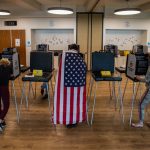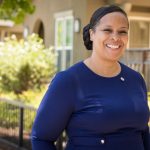Former San Jose Mayor Sam Liccardo, pursuing a rare opportunity to propel his political career to Washington D.C., took an early lead Tuesday night in an expensive, high-profile race against Assemblymember Evan Low to replace U.S. Rep. Anna Eshoo, who is retiring after more than three decades in Congress.
Liccardo had over three-quarters of the vote in the first Election Day results in an intense race that drew nearly $15 million in political spending for the 16th Congressional District seat that represents a sweeping district encompassing parts of San Mateo and Santa Clara counties from Pacifica in the north to Los Gatos in the south.
In the East Bay, BART Board Director Lateefah Simon was leading Jennifer Tran, a professor at Cal State University East Bay, to replace Rep. Barbara Lee in the 12th Congressional District that represents Alameda, Albany, Berkeley, Oakland, Piedmont and San Leandro. In early returns, Simon had a double-digit lead over Tran. The BART director, who’s considered one of the next Democratic rising stars, dominated the primary with over half the vote.
In the race to be California’s next U.S. Senator, alongside Sen. Alex Padilla, The Associated Press called the race for Rep. Adam Schiff right at 8 p.m. over his Republican opponent, former Dodgers star Steve Garvey.
Republicans flipped one Senate seat to deadlock the chamber Tuesday, while House races unfolded in a state-by-state slog and polls closed in key states that could decide control of Congress.
With control of Congress at stake, the ever-tight contests for the House and Senate will determine which party holds the majority and the power to boost or block a president’s agenda, or if the White House confronts a divided Capitol Hill. In the end, just a handful of seats, or as little as one, could tip the balance in either chamber. With a 50-50 Senate, the party in the White House determines the majority, since the vice president is a tie-breaker.
Liccardo and Low, both Democrats, are looking to make history in the District 16 race. If elected, Liccardo would be the first Latino member of Congress representing Northern California in over 120 years, while Low would be the first openly LGBTQ member of Congress to represent the Bay Area.
The battle for Eshoo’s seat has been contentious since she announced late last year that she would be retiring in January. The crowded March primary featured 10 candidates jumping at the chance to pursue a House seat without needing to fend off a longstanding incumbent.
Liccardo took first in the primary by more than 8,000 votes. But Low and Santa Clara County Supervisor Joe Simitian ended in a stunning tie for second — a congressional first in California since the state switched to a jungle primary system in 2012 where the top two vote-getters move on to the general election.
A recount of all 182,134 votes, requested by a former Liccardo campaign staffer, created further controversy, with allegations that it was orchestrated by the ex-mayor — an accusation his campaign vehemently denied. Low tried unsuccessfully to halt the recount before it even began, but in the end he came up five votes ahead of Simitian.
Since May, Liccardo and Low have duked it out on the campaign trail as millions of dollars flooded the race despite it not being one of California’s key battleground races. Collectively, Liccardo and Low spent more than $7.4 million through Oct. 16 to boost their campaigns and have raised even more — over $9.2 million altogether. Super PACs also spent big money, having shelled out more than $5.5 million on the race ahead of Election Day.
Sonoma State University Professor David McCuan described the influx of spending as “Dem on Dem violence” that has been sparked by term limits in the state legislature combined with Bay Area congressmembers holding on to their seats for decades.
“When a seat pops open, when Jackie Speier leaves or when Anna Eshoo leaves, there’s this drive to move to this place coupled with, let’s be frank, two really ambitious politicians,” McCuan said. “That also is important as a signaling device of intention so they draw a lot of dollars. So, you get these blood battles that go on within the family and all the political cousins around that table look a lot like that awkward Thanksgiving dinner.”
Melissa Michelson, a political science professor at Menlo College, said that whoever is elected to the District 16 seat is likely to stay there for decades to come as incumbents are often easily re-elected in Congress. Eshoo, 81, assumed office in 1993 at 50 years old. Liccardo is 54 and Low is 41.
Both candidates will likely vote the party line when it comes to major legislation, though their policy platforms are slightly different, Michelson said. Liccardo is also more of a moderate Democrat, while Low is more progressive. “Liccardo is talking more about working across the aisle and working with Republicans, and Low is talking more about the threat in a world with Trump as president,” Michelson said.
Both candidates have also touted a long list of endorsements. Liccardo was backed by San Jose Mayor Matt Mahan, Assembly Speaker Robert Rivas and former Rep. Jackie Speier, while Low gathered support from Gov. Gavin Newsom, the California Democratic Party and Rep. Ro Khanna.
The Associated Press contributed to this report.


